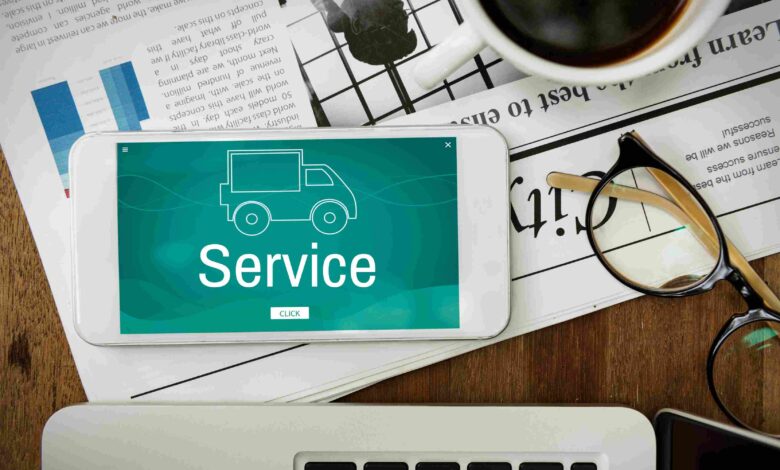Why Are Delivery Management Software Solutions Essential for Businesses?

Introduction
Businesses are always under pressure to produce goods and services precisely, efficiently, and swiftly in the fast-paced world of today. Whether you run a huge logistics company or a tiny e-commerce site, handling deliveries has become an essential aspect of providing a positive client experience. This is where delivery management software solutions come into play. They are designed to streamline and optimize the entire delivery process, from the moment an order is placed to the point of delivery.
But why are these software solutions so essential for businesses? In this article, we’ll explore how delivery management software improves operational efficiency but also enhances customer satisfaction, reduces costs, and helps businesses scale.
What is Delivery Management Software?
Delivery management software (DMS) is a tool that helps businesses plan, execute and track deliveries. It provides features like real-time tracking, route optimization, and automatic scheduling. Depending on the software, it can integrate with customer management systems (CRMs), inventory systems, and even payment gateways.
From handling large volumes of orders to ensuring each delivery is tracked and on time, DMS has become a vital asset for modern businesses looking to stay competitive.
The Growing Demand for Delivery Solutions
The rise of eCommerce, on-demand services, and the gig economy has significantly increased the need for reliable delivery solutions. Customers now expect fast, often same-day, deliveries. This shift in expectations means businesses need to ensure they are delivering on time but also keeping customers informed throughout the process.
With customer demands and delivery volumes on the rise, manual management of deliveries is no longer feasible. This has fueled the demand for best delivery management solutions across various industries.
Key Benefits of Delivery Management Software
Improved Efficiency and Organization
Manual tracking and planning can be tedious, leading to errors and delays. DMS automates key tasks, like assigning drivers, plotting routes, and sending customer notifications, all while keeping things organized.
Real-Time Tracking and Route Optimization
The real-time GPS tracking feature allows businesses and customers to monitor the delivery journey. This transparency ensures customers are always informed, which boosts trust. For businesses, route optimization ensures drivers take the most efficient path, cutting down on time and fuel.
Cost Reduction and Resource Management
One of the biggest advantages of delivery management software is its ability to reduce operational costs. By optimizing routes, reducing fuel consumption, and ensuring deliveries are executed efficiently, businesses can save money while reducing their carbon footprint.
Enhanced Customer Experience
The saying “the customer is always right” couldn’t be truer in the world of delivery. Customers want real-time updates, accurate ETAs, and hassle-free deliveries. Delivery management software ensures they receive all of this, helping businesses retain customers and build long-term loyalty.
Improved Efficiency in Operations
Managing multiple deliveries, especially during peak seasons, can overwhelm traditional systems. Delivery management software simplifies these tasks by automating schedules, ensuring that each delivery is assigned to the appropriate driver, and reducing the need for human intervention.
Additionally, these systems integrate seamlessly with CRMs, ERP systems, and inventory management tools, ensuring that every part of the business is aligned.
Real-Time Tracking and Monitoring
For both businesses and customers, being able to track deliveries in real-time is a game-changer. GPS technology enables real-time tracking, allowing businesses to monitor the progress of deliveries. Customers can see exactly where their package is, increasing satisfaction and reducing anxiety.
Route Optimization and Fuel Savings
With advanced algorithms, DMS solutions can calculate the most efficient delivery routes in real time. This ensures drivers avoid traffic, minimize fuel consumption, and deliver packages in the shortest time possible. The benefits? Lower fuel costs, faster deliveries, and reduced wear-and-tear on vehicles.
Cost Efficiency and Resource Allocation
Every business seeks ways to minimize costs while maximizing output. Delivery management software helps by allocating resources efficiently. For instance, it can assign deliveries to the closest available driver, reducing downtime and optimizing vehicle usage. This ensures businesses aren’t wasting valuable resources on unnecessary routes or idle drivers.
Enhanced Customer Experience
The delivery experience is often the last interaction a customer has with a company. A smooth, transparent, and timely delivery can significantly enhance customer satisfaction. Delivery management software ensures customers are kept informed throughout the process, reducing frustration and ensuring a positive experience. Moreover, timely deliveries increase the chances of repeat business.
Data and Analytics Capabilities
DMS solutions don’t just improve delivery operations—they provide valuable insights. With built-in analytics tools, businesses can track delivery times, driver performance, and customer feedback. These insights help companies identify inefficiencies, improve future deliveries, and make data-driven decisions for their logistics strategy.
Reducing Delivery Delays and Errors
Late deliveries or misdelivered packages can harm a company’s reputation. Delivery management software helps minimize these issues by providing automated scheduling, route optimization, and real-time tracking. This results in more accurate ETAs and fewer errors, giving businesses a competitive edge.
Scalability for Growing Businesses
As businesses grow, so do their delivery needs. Delivery management software solutions are built to scale with your business. Whether you’re delivering a few orders a day or managing a fleet of hundreds, the software can adapt to handle increasing volumes without sacrificing performance or efficiency.
Integration with Other Systems
For businesses using various tools to manage orders, customers, and finances, integration is key. Delivery management software often integrates with inventory management systems, CRM platforms, and payment gateways, allowing for smooth, uninterrupted workflows. This holistic approach ensures that all parts of the business are working together efficiently.
Industries That Benefit Most from Delivery Management Solutions
Several industries can greatly benefit from delivery management solutions, including:
- Retail and eCommerce: where fast, reliable delivery is essential for customer retention.
- Food delivery: where accurate ETAs and route efficiency are crucial.
- Logistics and supply chain: where managing large volumes of deliveries is vital for business success.
Each of these industries can benefit from DMS, ensuring timely and accurate deliveries.
Choosing the Right Delivery Management Software for Your Business
When selecting a delivery management system, businesses should look for key features like real-time tracking, route optimization, integration capabilities, and customizability. It’s also important to consider scalability and user-friendliness, ensuring the software can grow with your business and be easily adopted by your team.
Conclusion
In conclusion, delivery management software solutions are no longer a luxury—they are a necessity. They allow businesses to automate, optimize, and scale their delivery operations while keeping costs low and customers happy. Whether you’re a small business or a large corporation, investing in the right delivery management software can streamline your operations, boost efficiency, and drive growth.
FAQs
- What is the cost of implementing delivery management software?
Costs vary depending on the size of your business and the complexity of the features you need. Many platforms offer scalable pricing models.
- How secure is delivery management software?
Most solutions offer robust security features like encryption and multi-factor authentication to protect sensitive data.
- Can small businesses benefit from delivery management software?
Absolutely. Small businesses can streamline operations, reduce costs, and enhance customer satisfaction with the right delivery management tool.
- What are the most popular delivery management platforms?
Some popular platforms include Onfleet, Bringg, and GetSwift, each offering unique features tailored to different industries.
- How long does it take to implement delivery management software?
Implementation time varies but typically ranges from a few days to a couple of weeks, depending on the complexity of the business’s needs.





